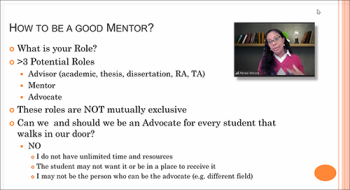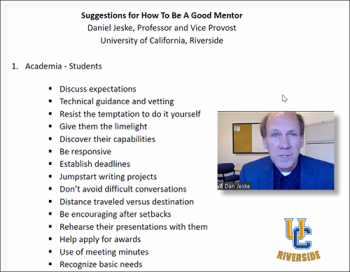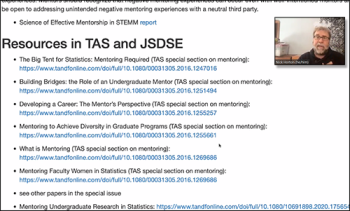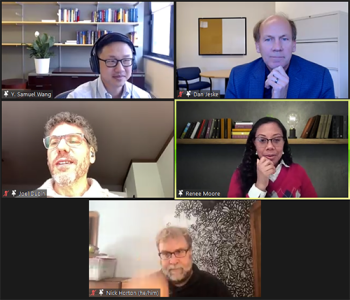



On February 25, 2022 from 12 to 1:30 pm NISS organized and held a webinar that focused on "The Importance of Being a Good Mentor."
Dr. Joel Dubin begins the day’s discussion advising to be adaptive and keep communication lines open. He states that it is beneficial to communicate your expectations to your mentees, your general mentoring style but to make sure you aren’t too rigid. Ensuring that mentees are comfortable with communicating with you will be very helpful in the long run. He also encourages mentors to think about keeping in touch in different ways. As a mentor, you want to apply your soft skills, skills in leadership and empathy. Think about leading a research team so that you can have multiple mentees in one place and learn from each other.
“No two mentees are the same and not everyone comes from the same backgrounds, not everyone works at the same pace either.”
- Dr. Joel Dubin
As the next speaker Dr. Renee Moore explained how the different roles of mentoring are diverse. You will be providing resources to students, setting goals, and be expected to meet deliverables and timelines with your mentees. Mentoring is also being an advocate for your mentee, helping them find their own direction. “Can we and should we be an advocate for every student that comes to you?” Not always. Dr. Moore suggests directing them to alternative sources if they need help or engage them with your older mentees to find balance.
Dr. Moore also echoed Joel on his advice about keeping communication lines open. It’s important to allow your mentee to be transparent and honest with you, and for you as the mentor to offer appropriate motivation. She emphasized that as mentors, we need to learn what the goal is before entering mentoring relationship and establish what your plan is together. Set up the plan and adapt it based on the mentee/mentor relationship. Also remember that mentoring can be short term or long term based on your role and your goal.
Team meetings? Yes! You can include mentees at all stages so that your senior mentees can provide advice to your junior mentees this way and can help each other grow and learn. In fact, each mentee having their own mentoring team is a good idea. Balance constructive and positive feedback, as Joel mentioned for using empathy during mentoring. Help your students get through the lows.
“It takes time to be a good mentor but it’s such an honor to be a mentor, and it’s very rewarding. It’s been great to learn from my mentees.”
- Dr. Renee Moore
Dr. Dan Jeske presented his advice on mentorship next separating the different types of mentees in academia from mentoring students to mentoring other faculty. He suggested that mentoring is more of a collaborative relationship in all of its stages. As a mentor, it’s important to resist the temptation to solve problems for students. Instead, Dr. Jeske insists that we ensure students have the limelight, it’s their show. The mentor’s job is to discover your mentee's capabilities and work with these.
His suggestions included to try to adapt where you can. For instance, some students like deadlines. If they have writer’s block, assist or make suggestions for their writing. If they have stage fright, rehearse their presentations with them. It’s very important to be encouraging, especially after a setback. Always remember to keep them from being too discouraged. He emphasized respecting the boundaries of students as there are power differentials to keep in mind as well as keeping meeting minutes. All of these things can be helpful when you meet with your mentees.
For mentoring faculty colleagues, Dr. Jeske recommends suggesting ways to help getting recognition, help identify fits for collaborative research, and help explain how success in academia works such as what the department values.
“Step back so that your mentees can step up.”
- Dr. Dan Jeske
Dr. Nick Horton was our last speaker for this event. He applauded the NISS Affiliates Committee for putting this together and emphasized how critical mentoring is at different levels. He also mentioned that he feels blessed to have received effective mentoring and had the chance to interact with many talented mentees. Among his comments, he stated that he believes that academia has the potential to institutionalize good mentoring, working with people who aren’t necessarily good at mentoring, helping them work with students and most important, becoming better listeners.
“There are a lot of ways we can improve mentoring and end up with a lot of productive conversations.”
- Dr. Nick Horton
In terms of the issue of power differentials, Dr. Horton emphasized defining the lines on how we can work together in a flexible way without crossing boundaries, making sure to mitigate and address issues where mentoring can do more harm than good so that we can make mentoring more effective.
Nick Horton shared a rich collection of valuable resources related to mentoring:
https://nhorton.people.amherst.edu/mentoring.html
Moderator Dr. Y. Samuel Wang, (Cornell University) was busy during the Q&A part of the session forwarding the many questions for the speakers to address, and the responses were very heartening to listen to as well. Questions included topics such as, “What are some things to consider when mentoring undergraduates? Have you found key differences, challenges, or best practices particular to this population when it comes to mentoring?”, “Writing is challenging for many students who are strong quantitatively. Can you please share your experience/advice on helping students write especially for those whose native language is not English?”, “The mental well-being of students is a great concern without entering their private space and maintaining the balance between advising and advocating. What are the tips? Referring them to experts may be something not every student prefers!” and “Is it your role to teach mentoring skills to your mentees too? What might be some tips you have around how to do that best?”
Loads of good questions and even better answers! This is a session that, no doubt, you will want to come back to again. Good thing we recorded it!
Recording of the Session
Slides/Resources Used by the Speakers
Joel Dubin, (University of Waterloo)
“How to Be a Good Mentor”
Renee Moore, (Drexel University)
“How to Be a Good Mentor: NISS Webinar”
Dan Jeske, (University of California, Riverside)
“Suggestions for How to Be a Good Mentor”
Nick Horton, (Amherst College)
https://nhorton.people.amherst.edu/mentoring.html
